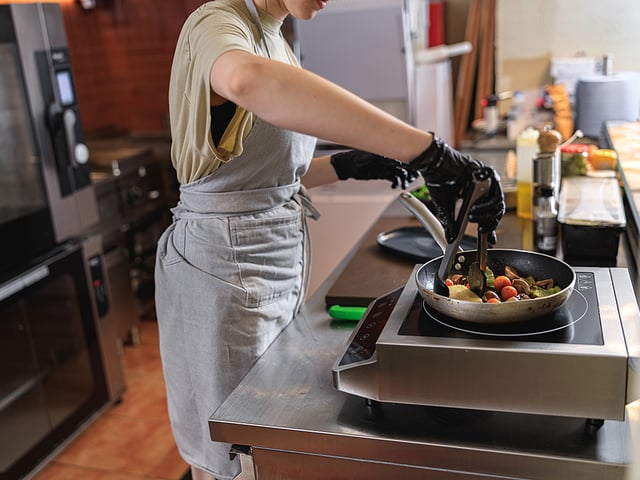
How Long Does ServSafe Certification Last?
The ServSafe certification is a critical credential for professionals in the food service industry, signifying their knowledge and commitment to food safety. This certification, administered by the National Restaurant Association, covers critical areas such as foodborne illnesses, proper food handling, and kitchen safety. Understanding the duration of ServSafe certification and the renewal process is essential for maintaining compliance and ensuring the highest standards of food safety in your establishment.
Understanding ServSafe Certification
The realm of food service is both dynamic and demanding, with safety and hygiene at its core. In this industry, the ServSafe certification emerges as a beacon of professionalism and knowledge, setting a benchmark for those involved in handling, preparing, and managing food. Let’s delve deeper into what ServSafe certification entails and its paramount importance in the food service industry.
What is ServSafe Certification?
At its essence, ServSafe certification is a rigorous program developed by the National Restaurant Association designed to arm food service professionals with the latest in food safety practices. This certification is not just a piece of paper; it’s a testament to the holder’s comprehensive understanding and commitment to food safety—a critical concern in the food service sector.
The ServSafe program encompasses a broad spectrum of topics crucial for maintaining high safety standards in any food service operation. These include:
Foodborne Illness Prevention: Understanding the causes and sources of foodborne pathogens, the conditions that promote their growth, and strategies to prevent foodborne illness outbreaks.
Safe Food Handling Practices: Covering the A-Z of handling food safely, from receiving and storing to preparing and serving, ensuring minimal risk of contamination and illness.
Effective Sanitation Practices: Detailed protocols for cleaning and sanitizing kitchen tools, equipment, and surfaces to maintain a hygienic preparation environment.
Personal Hygiene: Emphasizing the importance of personal hygiene practices for all staff involved in food preparation and service.
Pest Management: Strategies for preventing and managing pest infestations in food service establishments.
The certification process typically involves completing a course (either online or in-person) followed by passing an examination that assesses the participant’s knowledge and understanding of these critical areas.
The Importance of ServSafe Certification
Holding a ServSafe certification is much more than meeting a regulatory requirement; it’s a symbol of reliability and trustworthiness in the food service industry. Here’s why it’s so valued:
Employment Prerequisite: Many employers in the food service industry require ServSafe certification for key positions, particularly those involving direct food handling or preparation. It’s often seen as a baseline qualification for hiring, with some establishments mandating it for all staff members.
Public Health and Safety: At its core, the ServSafe certification is about protecting the health and safety of the public. Certified professionals are equipped with the knowledge to prevent foodborne illnesses, ensuring safe dining experiences for customers.
Regulatory Compliance: In many areas, local health departments require food service establishments to have a certain number of ServSafe-certified staff on the premises during operational hours. This certification helps businesses stay compliant with local health codes and regulations.
Professional Development: Earning a ServSafe certification is a significant professional achievement that can enhance career prospects. It demonstrates a commitment to quality and safety that can set an individual apart in the job market.
Consumer Confidence: Establishments with ServSafe-certified professionals can boast higher consumer confidence. Customers are more likely to trust and patronize restaurants that prioritize food safety, as indicated by their staff’s certification.
The Duration of ServSafe Certification
Understanding the validity period of ServSafe certification and the factors that influence its duration is crucial for professionals in the food service industry. It ensures continuous compliance with industry standards and local health regulations. Let’s explore the lifespan of ServSafe certification and the variables that can affect its validity.
How Long is ServSafe Certification Valid?
The ServSafe certification serves as a testament to a professional’s knowledge and skills in food safety practices. Typically, this certification is valid for 5 years from the date an individual passes the exam. This standard validity period is designed to ensure that food service professionals remain up-to-date with the latest food safety protocols and practices, considering the evolving nature of foodborne pathogens and safety technologies.
After this period, recertification is required to maintain one’s status as a ServSafe-certified professional. The recertification process involves retaking the ServSafe examination, ensuring that individuals refresh their knowledge and stay aligned with any new safety guidelines or regulations that have been introduced since their last certification.
Factors Affecting Certification Validity
While the standard validity period for ServSafe certification is 5 years, several factors can influence the need for earlier renewal or additional certifications, including:
Local Health Department Requirements: Depending on the location of the food service establishment, local health departments may have specific rules that affect the validity of ServSafe certification. Some regions may require food safety certifications to be renewed more frequently than the standard 5-year period. It’s essential for professionals to be aware of and comply with the regulations in their specific area to ensure uninterrupted operation.
Specific Job Roles: Certain positions within the food service industry may necessitate a more frequent renewal of ServSafe certification. For example, individuals in supervisory or management roles, responsible for training other staff in food safety practices, might be required to renew their certification more often. This ensures that those in leadership positions are always equipped with the most current knowledge and practices.
Changes in Food Safety Regulations: Food safety standards and regulations can evolve, driven by new research findings, technological advancements, or outbreaks of foodborne illnesses. When significant changes occur, it may necessitate earlier recertification for all food service professionals, regardless of when their current certification is due to expire.
Employer Policies: Some food service operators may implement policies that require more frequent renewal of ServSafe certification than mandated by local health departments. These policies are often part of a company’s commitment to maintaining the highest standards of food safety and quality.
Additional Certifications: In some cases, individuals may need to obtain additional certifications alongside ServSafe to comply with specific local or job role requirements. For instance, a bartender might need a different certification focusing on alcohol safety, in addition to their ServSafe certification for general food safety.
Renewing Your ServSafe Certification
Maintaining an active ServSafe certification is essential for professionals in the foodservice industry, not just for compliance with regulations but also for ensuring the highest standards of food safety. Let’s delve into the optimal timing for beginning the renewal process and the steps involved in renewing your ServSafe certification. ### When to Start the Renewal Process
To ensure continuous certification and compliance with industry standards, it’s crucial to begin the renewal process well before your current ServSafe certification expires. Here are some guidelines on timing:
Start Early: It’s recommended to initiate the renewal process at least 6 months before your certification’s expiration date. This timeframe allows ample opportunity to review any updated materials, complete necessary coursework, and schedule the examination without rushing.
Consider Processing Times: Remember to account for processing times for your renewal application and for scheduling your exam. Processing times can vary based on the volume of applications being handled and specific administrative procedures.
Stay Informed of Changes: Keep abreast of any changes in the ServSafe program or local regulations that might affect your renewal process. Updates might include changes in the curriculum, exam format, or renewal requirements that could necessitate additional preparation time. For example, ServSafe content was just recently updated to comply with recent changes to the FDA Food Code.
Set Reminders: Life in the food service industry can be hectic, making it easy to overlook renewal deadlines. Setting reminders a few months in advance can help ensure you don’t miss critical dates for starting your renewal process.
The Renewal Process
Renewing your ServSafe certification involves several key steps to ensure you remain certified without interruption. Here’s an overview of the process:
Review Updated Materials: ServSafe content may have been updated since your last certification to reflect new food safety standards and regulations. Begin by reviewing the latest study materials to ensure your knowledge is current.
Complete Required Coursework: Depending on the specific ServSafe certification, you may need to complete certain coursework before retaking the exam. This could be through online modules or in-person classes offered by authorized ServSafe instructors.
Register for the Exam: Once you’re prepared, register for the ServSafe certification exam. You can find exam dates and locations on the ServSafe website or through your employer if they offer testing.
Pay the Renewal Fee: There will be a fee for renewing your ServSafe certification, which varies depending on the specific certification and the mode of examination (online or in-person). Ensure you’re aware of the fee structure and make the necessary payment during the registration process.
Take the Exam: On the scheduled date, take the ServSafe exam. Ensure you arrive on time and bring any required identification or documentation.
Receive Your Certification: After passing the exam, you’ll receive your new ServSafe certification, valid for another 5 years. Keep a record of your certification details and the expiration date for future reference.
Stay Informed: Even after renewal, staying informed about the latest in food safety practices and regulations is essential. Regularly check the ServSafe website or sign up for updates to keep your knowledge up-to-date.
Preparing for the ServSafe Exam
Success in the ServSafe exam requires a combination of understanding the material, familiarizing yourself with the exam format, and employing effective study strategies. Below, we explore various study tips and resources to help you prepare efficiently and effectively for your ServSafe certification.
ServSafe Practice Tests
Practice tests are invaluable in preparing for the ServSafe exam. They serve several key roles in your study plan:
-
Familiarization with Exam Format: ServSafe Practice tests give you a clear idea of the question formats you’ll encounter, whether they’re multiple-choice, true/false, or scenario-based questions.
-
Identifying Weak Areas: Regularly taking practice tests can help pinpoint areas where your knowledge is lacking, allowing you to focus your study efforts more effectively.
-
Reducing Test Anxiety: By simulating the exam experience, practice tests can help alleviate test anxiety, making you more comfortable and confident on the actual test day.
ServSafe Study Guides
Study guides, whether provided by ServSafe or other reputable sources, are structured to cover all the necessary content areas for the exam. To use ServSafe study guides effectively:
-
Highlight Key Information: As you review, highlight or note critical points, especially those that are emphasized as major components of food safety.
-
Create a Study Schedule: Break down the study guide into manageable sections and create a study schedule, allocating specific times to each topic based on its difficulty and your familiarity with it.
ServSafe Flashcards
Flashcards are a tried-and-true method for memorizing key terms and concepts. They are especially useful for:
-
Retention of Definitions: Use flashcards to remember definitions of foodborne pathogens, safety protocols, and sanitation practices.
-
Spaced Repetition: Repeatedly reviewing flashcards over time can significantly improve recall and retention of information.
ServSafe Study Course
For those with a known timeline before their exam date, our study course can be particularly beneficial. This comprehensive course:
-
Condenses Key Information: Our study course for the ServSafe covers everything you need to know on exam day, broken down into manageable topics so you’re not wondering what you should be studying.
-
Offer Personalized Study Plans: Our course provides a personalized study plan based on the time you have left to study, ensuring you don’t waste valuable time studying things you don’t need to know on test day.
The Importance of Maintaining ServSafe Certification
In conclusion, the ServSafe certification is an essential pillar of professionalism and commitment to food safety within the food service industry. Its validity period of 5 years ensures that professionals remain current with evolving food safety standards and practices. Navigating the renewal process efficiently and leveraging various study resources for exam preparation are key to maintaining this certification. Ultimately, holding a ServSafe certification not only meets regulatory requirements but also signifies a dedication to upholding the highest standards of food safety, contributing to the health and well-being of the public and enhancing the integrity of the food service profession.
Keep Reading

ServSafe Food and Alcohol Safety Exams Blog
The Big Eight Food Allergens are Now the Big Nine
An allergen is typically a harmless protein that, for some, the immune …

ServSafe Food and Alcohol Safety Exams Blog
ServSafe Food Handler vs. ServSafe Manager: Which Course is Right for You?
The food service industry requires stringent adherence to safety and hy…

ServSafe Food and Alcohol Safety Exams Blog
How Many Times Can I Fail the ServSafe Exam?
The ServSafe exam is a nationally recognized food safety certification …